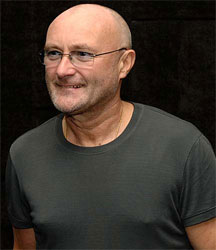Phil Collins Unable to Play Drums After Surgery

Phil Collins, 58, is currently unable to play the drums. The Genesis drummer and front man, also known for his solo career, underwent surgery in April to repair a dislocated neck vertebrae. Since the surgery, the singer still has numbness in his hands and is unable to hold drumsticks. According to the official Genesis website, Phil says:
“There isn’t any drama regarding my ‘disability’ and playing drums.Somehow during the last Genesis tour I dislocated some vertebrae in my upper neck and that affected my hands. After a successful operation on my neck, my hands still can’t function normally.
“Maybe in a year or so it will change, but for now it is impossible for me to play drums or piano. I am not in any ‘distressed’ state, stuff happens in life.”
This is not stopping the Collins from planning to release a new CD of Motown covers in 2010.
The spine of the neck consists of 7 cervical vertebrae - the bony structures that supports the head and protect the spinal cord that passes through them. Between the vertebrae are cushions made of cartilage, called the intervertebral discs,which keep the spine flexible and act as shock absorbers. Strong fibrous tissue, called ligaments and bony protrusions of the vertebrae called facets further stabilize the spine. The spinal nerves pass through a second space, called foramen, between the vertebrae on each side of the spine, out to the neck and upper body.
A cervical vertebral dislocation refers to the displacement of one neck vertebrae in relationship to the ones above and/or below it. Disruption of the surrounding ligaments, either by trauma or degeneration of the discs, allow the vertebrae to move their positions. If the shift is slight, it is called a subluxation. If a greater shift occurs, it is called a dislocation. The most common place for cervical dislocation is between C5 and C6. Vertebral shift can cause pressure on the nerves coming through the foramen, leading to symptoms of pain, numbness, or weakness in the shoulder, arm, wrist or hand. This is called cervical radiculopathy.
Free e-book
| Resounding Health(tm) Neck Pain/ Cervical dislocation |
Advertisement:
[AMAZONPRODUCT=B00000D9TQ] [AMAZONPRODUCT=B000002IHQ] [AMAZONPRODUCT=B000641Z90]

























0 comments